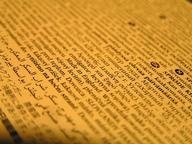Quiz Answer Key and Fun Facts
1. When English took over French words it often changed their stress pattern, and adapted it to the Germanic first-syllable stress tendency. MariAge became MARRiage. SerVICE became SERvice. What English word was born from a new way to pronounce the French 'maniere'?
2. Many words that look as if they were pure English are in fact French in disguise. Example: 'beast' is from Old French 'beste', modern French 'bete'. The original Anglo-Saxon word for an animal had been 'deer'. What English word derives from the French 'coupe'?
3. More intriguing is the fact that very often the French vocabulary that got mixed up with English did not come from Parisian French but from EITHER Northern French OR Norman French. Northern French had W-, where Parisian French had GU- or G-. Sometimes English derived from BOTH types of French. From Parisian French gardien it derived guardian and from Northern French warden. Un garde became either a guard or a ward (the person to be 'guarded). What English word was derived from the North-French for 'guerre'?
4. In a number of words Northern French had 'hard c' pronunciation as in 'cat', whereas Parisian French in similar words had the 'ch' of 'cheese', 'chat', etc. This led to parallel borrowings such as 'cattle', from Northern French, and 'chattel' (legal term for movable possessions) from Parisian French. As a parallel to a derivation 'chase' from Parisian French 'chasser', there was one from the Northern French word for 'running and seizing': to __________ ?
5. From Parisian French, English borrowed a word 'champagne' (wine from the plains near Reims) with 'ch'-pronunciation as in 'chat',whereas from Northern French it took the parallel word 'campaign' (= battle in a plain) with 'hard c' as in 'cat'. The proper name 'Campion' is from Northern French and originally meant 'a fighter in a field', later 'fighter in a tournament', and still later 'somebody who fights to defend the honour of a lady' or more generally 'defender of a cause'. The equivalent of that word in Parisian French and in modern English is of course:___________
6. For a long period the two languages were used in a kind of coexistence. There were even a number of 'double phrasings'. In which of the following examples does the 'French' word precede the 'Anglo-Saxon'?
7. Very often English kept the original Anglo-Saxon root-word as the substantive, but borrowed from French (and indirectly from Latin) to create an adjective. Which of these words is the Romanic adjective form that compensates for the absence of an Anglo-Saxon adjective for 'belonging to the house?
8. Sometimes French words went new ways in English. Old French "noise" meant 'an outcry'. In English it developed the meaning: unwanted, unpleasant or loud sound, which in French is "bruit". In the same way French "lard" originally had the meaning of fat bacon or pork, or the internal fat of a swine's abdomen. In English "lard" got the exclusive meaning of 'soft white creamy substance made from pig fat', used in cooking. What is the modern French word for the English "lard"?
9. 'Hastings' had its effects on the grammar of English as well. One of the examples: English took over some phrases in which the adjective FOLLOWS the substantive (as happens mostly in French). Examples: Lords TEMPORAL and Lords Spiritual, States GENERAL, from times IMMEMORIAL, the body POLITIC. You find another example in the title for the 'official poet of the nation' in Great Britain. That poet, who is honoured by the monarch and may occasionally be asked to write poems about important public events, is traditionally called the: _____ _______ ?
10. The ultimate effect of the French (or 'Romance') influence on English vocabulary is that it became an extremely rich language in which Romance words often offer good (near- or semi-) alternatives for the original Anglo-Saxon words. Which of these is however NOT a correct example of an 'Anglo-Saxon vs. French' pair, because neither word is Anglo-Saxon?
Source: Author
flem-ish
This quiz was reviewed by FunTrivia editor
CellarDoor before going online.
Any errors found in FunTrivia content are routinely corrected through our feedback system.

